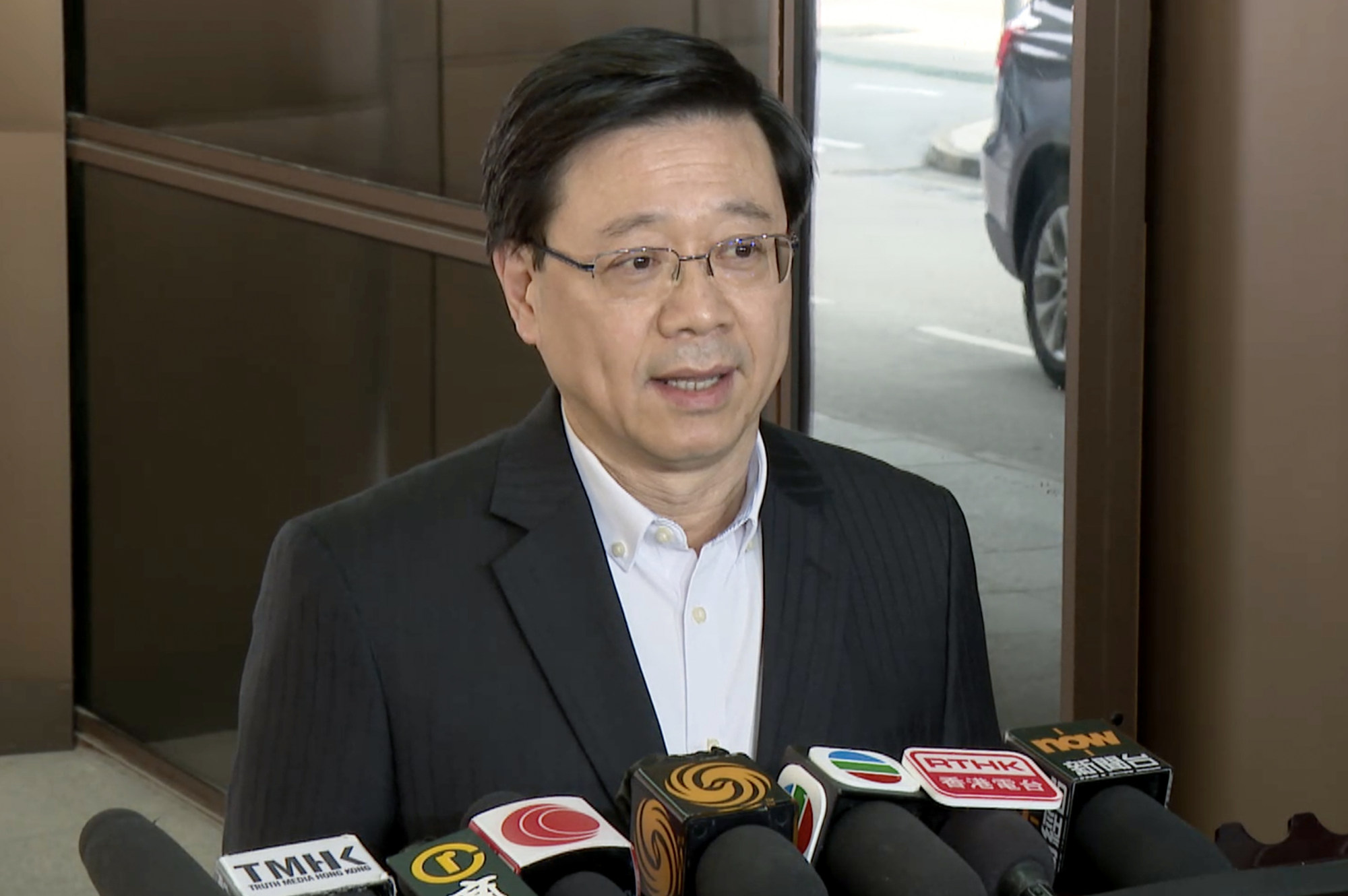
Top Beijing official tells Hong Kong’s John Lee to ‘nip’ national security risks in the bud, warns of ‘destructive forces’ in city
- Xia Baolong tells Hong Kong’s leader to handle any national security risks by ‘nipping them in the bud’ and urges him to work on risk management
- Political commentator warns city’s status as international finance centre makes it ‘more exposed’ than China to national security risks posed by Western countries
Hong Kong leader John Lee Ka-chiu has said a top Beijing official urged him to remain vigilant and swiftly tackle any national security risks by “nipping them in the bud”, warning of “destructive forces still lurking” in the city.
Returning to Hong Kong on Monday after political meetings in the capital, Lee also said he had promised Xia Baolong, director of the State Council’s Hong Kong and Macau Affairs Office, that his administration would focus on better managing risks and strengthen its intelligence-gathering efforts.
“We will firmly crack down on any attempts to undermine national security, Hong Kong’s peace and overall interests, and hold perpetrators legally responsible,” Lee said.

In the capital over the weekend, Zheng Yanxiong, who oversees Hong Kong affairs, told city representatives of the country’s top legislature that the central government firmly supported the further internationalisation of the financial centre, remarks that analysts said underscored its key role in the nation’s return to growth following the end of the Covid-19 pandemic.
Revealing details of his discussion with Xia, Lee said the director had acknowledged his administration’s efforts to unite Hong Kong in pursuit of economic growth, but the office director also urged local officials to remain vigilant over possible risks to national security.
‘Threat’ of prison visitors to be investigated: Hong Kong security chief
“He reminded us to work on risk management and have preparatory plans as national security risks still exist and that some destructive forces are still lurking in society,” Lee said. “We should hit out at any moves that would jeopardise national security, public peace or Hong Kong’s safety, nipping them in the bud and not letting them spread.”
He added that Xia had recognised the work of the city’s administration over the past eight months, with the top official extremely pleased to see different industries coming together to support Hong Kong’s economic development and the push for national integration.
However, Lau Siu-kai, a consultant at the Chinese Association of Hong Kong and Macau Studies, a semi-official think tank, said that while there were no longer “violent confrontations” on the streets, national security in the city was still vulnerable to geopolitical tensions.
Hong Kong hits back at UK foreign secretary’s remarks on national security law
“Hong Kong, as an international financial centre, is more exposed than China. Western countries, therefore, are trying to attack China by smearing the city’s political situation,” he said.
“It is impossible for Hong Kong to stay away from the escalating Sino-US tensions.”
Lee on Monday also weighed in on the last-minute cancellation of a women’s rights demonstration planned for Sunday. The event would have been the first authorised rally since the last of the city’s anti-epidemic measures and the mask mandate were lifted.

But the Hong Kong Women Workers’ Association on Saturday called off the march, without giving a reason. Police had warned that violent gangs were among those who had expressed an interest in joining the march.
The city leader said organisers were required to ensure public events were safe, orderly and lawful, in addition to following the instructions of police.
“Anyone who does not have the confidence or ability to do that, or worry that they cannot handle it, should not organise these public events as they are required to shoulder legal responsibilities,” he said.
Hong Kong political group says police told members to avoid women’s rights rally
On Sunday, the opposition League of Social Democrats group said four of its members were earlier questioned by members of the force’s National Security Department and warned against joining the march.
Lee also said Hong Kong’s stability following the 2019 anti-government protests was “not easy to come by” and urged people to treasure it, adding residents had many ways to express their views.
Xia, appointed to oversee the city’s affairs in 2020, is set to retire after he stepped down as a vice-chairman for the country’s top political advisory body, the Chinese People’s Political Consultative Conference.
On Sunday, Zheng, head of Beijing’s liaison office in Hong Kong, told local National People’s Congress delegates that central authorities firmly supported the city maintaining its common law system and its atmosphere of cultural inclusiveness, describing the latter as “most conducive to attracting global talent, investors and consumers”.
Zheng’s remarks came hours after Premier Li Keqiang set out a national economic growth target of around 5 per cent this year, while also calling for the prioritising of economic stability and the pursuit of high-quality development following the rollback of the country’s dynamic zero-Covid strategy starting last December.

Professor Sonny Lo Shiu-hing, a political commentator, said the emphasis on Hong Kong’s global connectivity indicated it was vital in accelerating the internationalisation of the renminbi, with the city a core participant in the process.
“Also, reassuring the persistence of [Hong Kong’s] common law system is important in attracting foreign investment, such as those from the Middle East and other continents,” he said.
However, Hui Ching, a member of the Hong Kong Zhi Ming Institute, a policy think tank, cast doubts on whether the city could successfully fulfil such a key role amid China’s ongoing geopolitical tension with the West.
“Beijing has stressed it has overall jurisdiction over Hong Kong. That means Hong Kong should toe Beijing’s line,” he said.
“As such, Hong Kong will become more like a relatively more open city on the mainland, rather than an international city with close ties with the West as it used to be known.”


